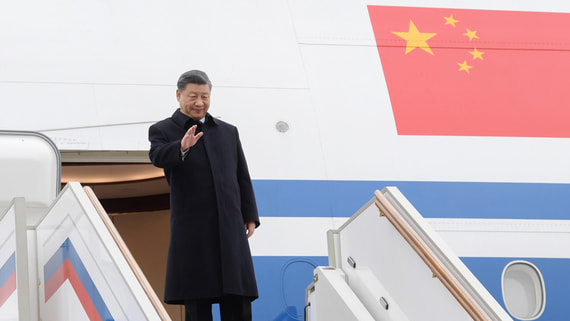US and Chinese leaders will meet in mid-November during the APEC summit in California
[ad_1]

White House press secretary Karine Jean-Pierre confirmed that the United States expects Chinese President Xi Jinping to visit the country in mid-November for the Asia-Pacific Economic Cooperation (APEC) summit. Negotiations between the Chinese leader and US President Joe Biden will take place on its sidelines. The forum will be held in San Francisco from November 11 to 17. “This will be a constructive meeting. The President is looking forward to it,” said Jean-Pierre. However, she did not give details of the agenda for the negotiations, only noting that “the president has a difficult but important conversation to have.” The spokeswoman also said the “intense competition” between the two countries meant intensive diplomacy was needed.
Next, information about Xi’s readiness to go to the United States was confirmed at a press conference by the official representative of the Chinese Foreign Ministry, Wang Wenbin. According to him, China and the United States have agreed on the need to organize a meeting of the heads of the two states in San Francisco. At the same time, he again made a reference to the words of Chinese Foreign Minister Wang Yi, which he said during his visit to the United States at the end of October: the road to the meeting of leaders in San Francisco cannot be passed “on autopilot”, and for this “it is necessary “put into practice the two-state consensus” that Xi and Biden reached during their previous meeting at the G20 summit in Bali in November 2022, writes CGTN. In particular, at the end of the summit, the leaders’ press releases included the wording “responsible competition” and expressed hope for a new level of US-Chinese relations to solve global problems.
The day before, October 31, the Hong Kong newspaper South China Morning Post published an article about the reasons why Beijing delayed confirming Xi’s visit to the United States. According to analysts, this behavior reflected the low level of trust between the parties, the political culture of the PRC, and fears that Xi could be embarrassed by last-minute events. In addition, China might want to seek some kind of guarantees from the Americans ahead of the visit, such as promises that the US authorities will not announce new sanctions or other similar measures during the visit.
Xi already has an unusual personal experience of communicating with an American leader on his territory – with Donald Trump in 2017. Then, during dessert, he informed the head of the PRC about the launch of missiles in the direction of Syria. “He was silent for 10 seconds, and then asked the translator to repeat it,” Trump said about the first reaction of the Chinese chairman to these words. Biden announced a new meeting with Xi back in June. For the first time, The Washington Post reported on October 6 that the White House had begun planning a meeting between the US President and the Chinese President on the sidelines of the APEC summit. However, their meeting at the 2023 G20 summit in India did not take place, as Xi decided to skip this event.
On September 26, Marat Berdyev, Ambassador-at-Large of the Russian Foreign Ministry and its senior representative at APEC, said that Washington was not going to invite some world leaders to the upcoming summit in San Francisco, including President Vladimir Putin, due to sanctions restrictions. In total, APEC includes 19 countries and two territories in the Asia-Pacific region.
A direct meeting with Biden is important for Xi, which will help understand the current American approach to Taiwan and the situation in the South China Sea, says Alexey Maslov, director of ISAA Moscow State University. China would ideally like the US not to get involved in these disputes at all, he adds. At the same time, Xi probably received some assurances through Wang Yi that there would be no harsh criticism of China in San Francisco, and that the parties were ready for positive negotiations. But if in the remaining time some kind of provocation happens, like the one in February with balloons, then the visit could be disrupted, Maslov admits.
In addition, China has recently put forward a number of new projects within the framework of the Belt and Road Initiative, which both complement and run counter to the APEC format. This organization continues to operate within the original concept of the 1990s. (primarily we are talking about economic interaction), and the Belt and Road follows the path of digitalization and knowledge intensity, which Xi will be able to advantageously emphasize in the United States. China is also concerned about logistics issues that have arisen as a result of conflicts in Ukraine and the Middle East, and Beijing is likely trying in every way to establish trade cooperation, Maslov says.
If no emergencies occur in the time remaining before the APEC forum, then really important negotiations will take place in San Francisco in the context of tensions in relations between China and the United States, says St. Petersburg State University professor Yana Leksyutina. At the same time, the parties cannot afford to organize reciprocal state visits and therefore use links to large events like APEC. A peculiarity of Chinese diplomacy in recent months is that China is late in confirming Xi’s participation in this or that event. Moreover, even specific dates for the Belt and Road Forum were not announced for a long time – and this behavior of the Chinese is difficult to explain rationally, the expert says.
[ad_2]
Source link








